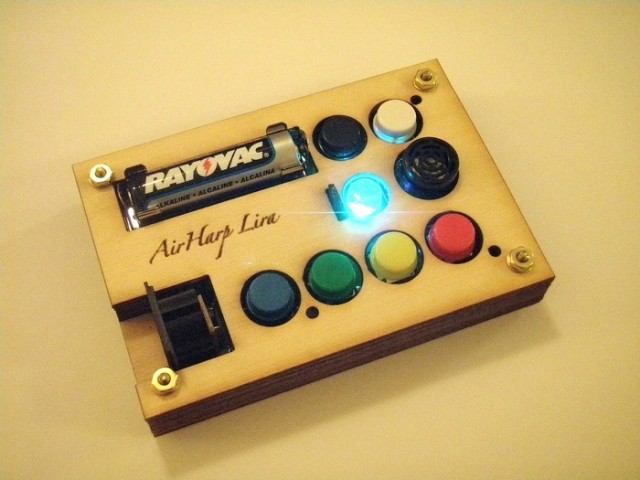
Developer Peter DeSimone has announced a Kickstarter project to develop a production version of the AirHarp – an open-source ultrasonic digital autoharp MIDI controller that’s sort of like the theremin of harps.
The AirHarp responds to hand gestures and translates them into MIDI. You play the AirHarp by moving your hand through the air, ‘strumming’ virtual harp strings much like a theremin player controls pitch by the position of her hand. You can control which strings are playable using the fingers of the hand that holds the AirHarp.
The AirHarp is open source, based on Arduino, and DeSimone provides instructions for building a DIY version on his site. The Kickstarter project goal is to build production AirHarps in large enough volume to get the price of pre-assembled AirHarp instruments down to US $100 each.
Here’s DeSimone introducing the AirHarp and how to use it:
Here’s what he has to say about the AirHarp:
The AirHarp Lira is the latest in a series of AirHarp models designed and built by Peter DeSimone and Erik Jacobson. It’s a MIDI controller instrument, so it doesn’t make sound on its own. Rather, it sends messages to a computer, synthesizer or other device, which in turn creates the actual sound.
Backers are encouraged to familiarize themselves with software synthesis and the use of MIDI controller instruments prior to purchasing an AirHarp Lira. However we will do our best to assist any customers who have issues setting up software synthesis. You will need a MIDI cable for use with a keyboard synthesizer, or a MIDI to USB converter cable for use with a computer.
Here’s the official overview video for the Kickstarter project:
The AirHarp will be available for $100 to supporters of the Kickstarter project. For more information, see the project site.

Really tired of these tiny devices with no decent interface design.
It’s open source – so its open for anyone to mod or improve.
This looks fun to me – but I’d like to see this demonstrated with some more musical sounds.
Not sure if it’s intentional, but the demo sounds remind me of an OmniChord.
The Suzuki Qchord (and its ancestor, the Omnichord) were absolutely inspirations in the AirHarp’s design. I wanted the basic functionality of the Qchord in a much smaller package, and I think I succeeded! 🙂
The music that plays during the last few minutes of the video (“AirHarp Groove”) was made entirely on an AirHarp with the exception of percussion. If you scroll down on the Kickstarter page, there’s an embedded SoundCloud recording of this demo piece. I don’t remember how many different patches I used to make that, but it was a lot. 😉
Uh-oh! D-BEEM!!!!! 😀
Does this allow you to customize the chords available in each of the modes?
By default, you can play any major or minor chord. If you want fanciness like 7ths, dims & augs, you would have to add that yourself in firmware. Perhaps in the future we will make a model that has these capabilities, but you only have so many fingers on one hand, and the goal was to keep the interface simple enough to facilitate a quick learning curve. Cheers! ~ Peter
I can’t think of a worse synth sound. I didn’t know anyone still made “late 80’s soft rock ballads that you now only hear at 2am in 24 hour shopping centers” patches in sound banks anymore.
I hope that you don’t judge all MIDI controllers based on how they sound!
Looks interesting but as soon as I hear open source or hackable I lose interest. Again sure this is great if you know your way around code but definitely niche!
The kick starter is for premade ones that are $100. You can get the DIY kits for less, but as you mentioned, is more of a niche due to the requirement to build it yourself.
How can something being open source ever be a bad thing?
It means that you (or someone technically inclined) can fix it or mod it if you ever need to. It means if someone else can figure out how to do it better they can.
It doesn’t mean that you have to do these things, though, just that you can!
You don’t have to be a tech head to use open source hardware or software – just look at how easy the Makey Makey is to use!
just PROMISE ME you will not sell this idea to FACEBOOK –
$2 billion for MIDI controllers!